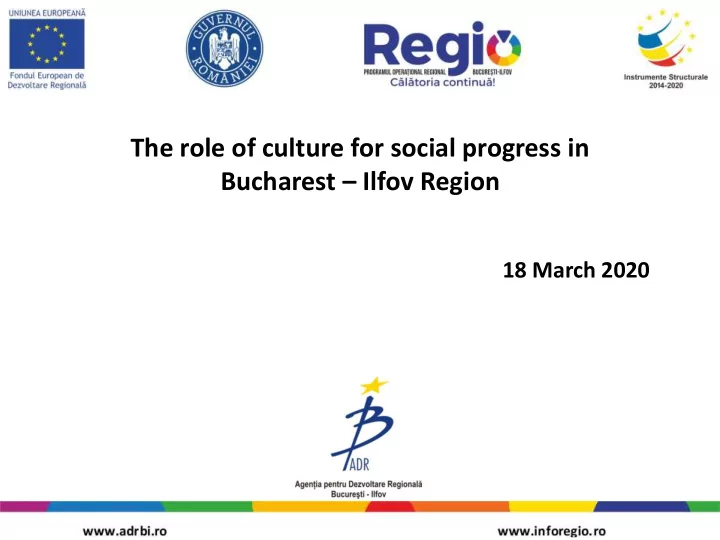

The role of culture for social progress in Bucharest – Ilfov Region 18 March 2020
Bucharest-Ilfov Regional Development Agency (ADRBI) ▪ 1999 – founded as non-profit NGO for public utility ▪ 2004 – up date regional development law ▪ 2007-2020 – intermediate body for REGIO 163 Mihai Eminescu Street, Bucharest ADRBI provides specific services to the local public administration as well as to the private sector for the development of the Bucharest-Ilfov Region
The importance of cultural development Cultural development is based on the interaction and cooperation of a wide range of actors who forms the cultural ecosystem (including public institutions, civil society organizations and the private sector) in a way that cultivates innovation. 3
Cultural activities in Romania in 2018 • 24% of the population participating at least once in cultural activities • 37% of the population participating at visits to a historical / cultural park or to an objective of heritage (monuments, historical or artistic sites, archaeological sites) • 6% attending a concert or a musical show • 2.45% household expenditure for culture (2016) https://www.culturadata.ro/wp-content/uploads/2019/10/UNESCO- CDIS-Romania_Raport-analitic-si-tehnic-RO-web.pdf 4
Cultural statistics in Bucharest - Ilfov Region 2014 2015 2016 2017 2018 Entertainment 46 47 42 45 45 institutions Number of shows 5320 6340 6774 6392 7087 and concerts Spectators 1,137,510 1,371,324 1,467,578 1,434,753 1,750,851 5
The Ministry of Culture - Objective Increasing and diversifying the supply and supply of cultural consumption, with emphasis on cultural diversity and its effects on economic development and social inclusion 6
Measures at national and local level • Facilitating access to cultural goods and services for vulnerable categories. • Promoting original artistic content, cultural genres as much as possible different. • Promoting cultural consumption in conventional and unconventional spaces. • Promotion of complementary distribution channels. • Encourage the use of ICT for cultural consumption. • Promote the knowledge of cultural expressions of ethnic groups and vulnerable categories. 7
The National Institute for Cultural Research and Training (INCFC) • Subordinated to the Ministry of Culture, is the only national institute that aims to study, research and provide statistical data in the field of culture as well as training professionals who choose a career in this field. https://www.culturadata.ro/home/ 8
Romanian National Institute for Statistics • Statistics on Culture in six dimensions: 1. LIBRARIES (no., volumes, active readers, employees) 2. CINEMATOGRAPHIC EXPLOTATION AND PRODUCTION (no, places, screenings, audience, film production) 3. ENTERTAINMENT INSTITUTIONS (institutions, spectacles and concerts, audiences, places, employees) 4. MUSEUMS (no, visitors, employees) 5. PRINTING HOUSES (printed books and booklets, printed handbooks, newspapers, magazines and other periodicals) 6. RADIO AND TELEVISION BROADCASTS (duration and structure of broadcast, type of emissions, location, language of minorities, ownership) 9
Bucharest - Museum of Roma Culture • Since 2013 • The museum aims to be a source of in-depth knowledge that will contribute to reduce cleavages between Roma and other communities. • a space for confrontation and reconciliation of ideas about Roma communities againts prejudices and stereotypes. • https://www.facebook.com/muzeulculturiiromilor 10
Romanian historical monuments • Romania – appreciated to have a very valuable architectural heritage, – Special law for protection of historical monuments (2001) but with poor results and real involvement of the authorities – Confronts with an erroneous perception of the society, that is to say historical monuments are only consuming funds, with no visible benefits from the investment. • The built heritage is a factor of local and regional development, a catalyst for cultural and social life. 11
Historical monuments in Bucharest Ilfov Region Total Monuments Assemblies Sites Monuments A (national interest) 341 287 37 17 Monuments B (local interest) 3039 2768 77 194 TOTAL 3380 3055 114 211 Through Regional Operational Program 2007-2013 has been restored and strengthened 6 historical monuments 12
Historical monuments from Bucharest Ilfov Region Palace of Patriarchy , Bucharest St. Sofia Curch, Bucharest
Historical monuments from Bucharest Ilfov Region Astronomical Observer V. Urseanu, Bucharest
Historical monuments from Bucharest Ilfov Region Cesianu-Filipescu House hosting Museum of the Ages N. Minovici Folk Art Museum Arch of Triumph, Bucharest 15
Regional Operational Program 2014-2020 • 10 projects contracted for consolidation, rehabilitation, digitalisation, increasing the number of visitors with 25.14 mil Euro from EU grants (historical churches, National Archives building, Palace of the National Military Circle, National Museum of Firemen) 16
Importance of culture • Culture plays a central role in maintaining and improving the quality of life and the well-being of people and communities. • Cultural values, attitudes and beliefs shape nature and quality social relations, have a direct impact on the feeling of integration, emancipation, trust, tolerance for diversity and cooperation and guides individual and collective action. • Hard to measure, but for sure related to many indicatators of social and economical progress. 17
Conclusions Dimitrie Gusti – Romanian sociologist, ethnologist, historian • “The creative higher culture cannot be separated from the culture of the people” . • “Culture cannot be imposed from above; being a personal business, it must therefore live in an atmosphere of freedom, spontaneity and national specificity” . 18
BUCHAREST-ILFOV REGIONAL DEVELOPMENT AGENCY Intermediary Body for Regional Operational Programme THANK YOU FOR YOUR ATTENTION! 163 M. Eminescu Street, Bucharest, Romania Phone /Fax: +4 021.315.96.59; +4021.315.96.65 Phone helpdesk: + 4021.313.80.99 Email: anacristina.adumitroaei@adrbi.ro liviu.rancioaga@adrbi.ro www.facebook.com/adrbi
Recommend
More recommend